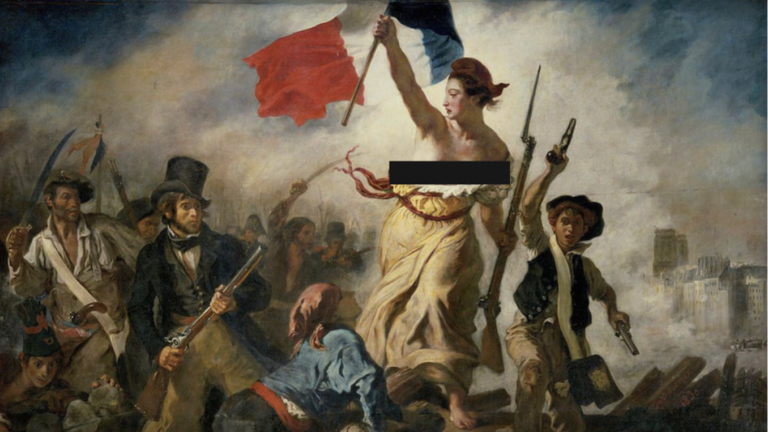
PARIS — The center-right French government led by Emmanuel Macron confirmed over the weekend that it will attempt to bypass the courts to force the five largest adult sites accessible in the country to comply with a controversial, vaguely worded 2020 age verification law.
According to a report published Monday by leading French newspaper Le Monde, Macron’s government is frustrated with the legal challenge mounted by lawyers for Pornhub, Tukif, xHamster, XVideos and Xnxx.
As XBIZ reported, last month the five adult tube sites presented their ongoing objections to the controversial 2020 law allowing France’s online content regulator, ARCOM, to seek a blocking order to target “websites that fail to prevent minors from accessing online pornography.”
The lawyers presented requests to nullify the proceedings and order a stay of the proposed block. The tribunal then gave itself until July 7 to make a decision.
France’s age verification mandate was surreptitiously added to a hastily approved domestic violence law during an atypical and sparsely attended COVID-era session of the French Parliament in July 2020.
On Sunday, Minister Delegate for Digital Jean-Noël Barrot announced the government’s intention to empower ARCOM to order, without needing to go through the courts, the blocking and delisting of adult sites that do not prevent minors from accessing their content.
Speaking to Agence-France Presse, Barrot stated, “There is an urgent need to remove our children from the onslaught of porn images on the internet and uphold the law once and for all.”
Le Monde reports that the extra-judicial gambit will be part of a new bill intended to “secure and regulate the digital space.”
Barrot intends to present the bill to the Council of Ministers on Wednesday, and expects it to be examined in the Senate over the summer and by the National Assembly “by the start of the school year.”
The bill will also empower government regulator ARCOM to “stop the dissemination on the internet of media banned in the European Union.”
A New Law Based on a ‘Hell’-ish Report
Barrot said the new bill is based on a report by four senators who denounced “the excesses of this industry,” Le Monde reported, referring to a sensationalistic, virulently anti-porn September 2022 report literally comparing the adult industry to the Christian “hell” and recommending state regulation and censorship.
The report is titled “Porno, l’Enfer du Décor,” combining a pun on the French expression “l’envers du décor,” meaning “behind the scenes,” with the word for “hell” — “enfer,” as in “infernal.”
“Porno, l’Enfer du Décor” was the result of six months of hearings conducted by Senators Annick Billon, chair of the committee for women’s rights (UDI, Vendée); Alexandra Borchio Fontimp (LR, Alpes-Maritimes); Laurence Cohen (Communiste, Val-de-Marne); and Laurence Rossignol (Socialiste, Oise).
That senate report was influenced by sensationalist media coverage of what the press called “sordid affairs” involving a few adult producers and shoots — some going back to 2009 — that were publicized last year.
The three sex work abolitionist groups behind the media campaign and the senate report — Movement of the Nest, Dare Feminism and The Indignant Women (Le Mouvement du nid, Osez le féminisme and les Effrontées)— denounced all pornography as “a pimping and criminal industry at a global scale,” labeling all adult content as “patriarchal propaganda feeding misogyny, racial hatred and rape culture.”
Celine Piques, a spokesperson for Dare Feminism, told the left-leaning newspaper Libération in September that the hearings conducted by the Senate’s committee for women’s rights demonstrated “the systemic character of the violence at the core of this industry.”
“We are not talking about a few ‘black sheep,’ but about a system,” Piques said.
Piques said she wished the report would “make society finally change its view about the porn industry” and demanded the government make the fight against porn “a public and criminal policy priority.”
A Government Determined to Discipline and Punish Adult Websites
Barrot said in February that he was committed to bring about, in 2023, “the end of access to pornographic sites for our children.”
The 2020 law requires that adult companies institute measures beyond simply asking an internet user whether they are of age. It also empowers a government official — the president of ARCOM — to demand that the president of the judicial court order ISP providers to immediately block infringing sites in the entire country.
According to French tech journalist Marc Rees, who has been reporting on the developments for news site Next INpact, the tube sites’ constitutional challenge is based on the legislators’ vagueness in drafting the law, which violates the legal principle of “freedom of expression and communication.”
During the April 14 hearing, lawyers for the tube sites argued that compliance cannot possibly be effected until ARCOM publishes clear guidelines, something the government has conspicuously neglected to do. Meanwhile, the complaining groups have actively fought against issuing clear content guidelines, as part of their campaign to prevent open platforms — including Twitter and Reddit — from hosting what the groups consider explicit material.
Anti-porn activist Thomas Rohmer, founder of Digital Education Watch — one of the nonprofits behind the campaign to force the websites to comply with the law — told Catholic news site La Croix last month that he had urged ARCOM not to publish any clear content guidelines, which he called “a trap in which these sites want to snare us” and warned that his group will “fight so that it does not take place.”
Free Speech Coalition Director of Communications Mike Stabile tweeted on Monday that Barrot’s proposal to allow ARCOM to block adult sites without going through the court system was “incredibly dangerous.”
Censorship regimes, Stabile added, “start with porn, but it never ends with porn.”